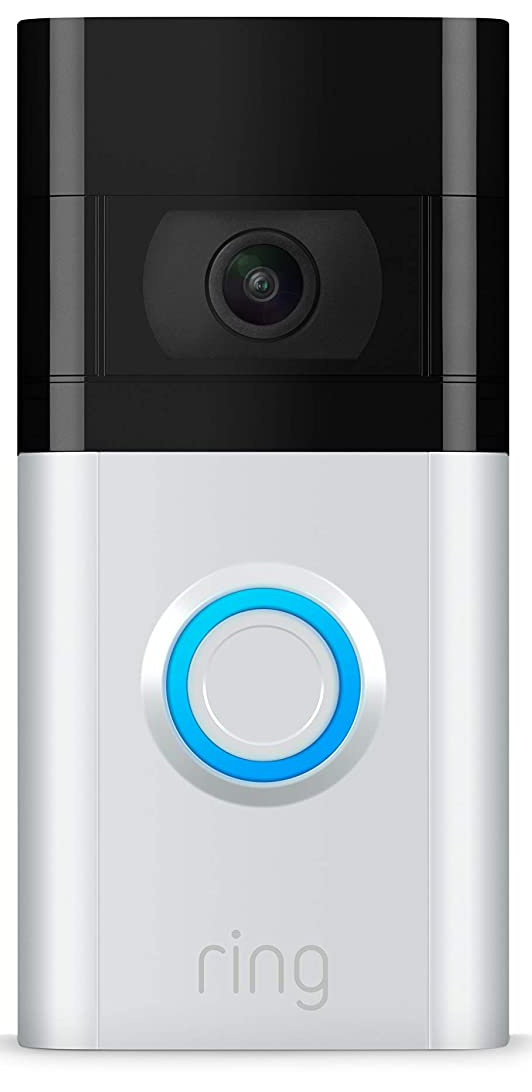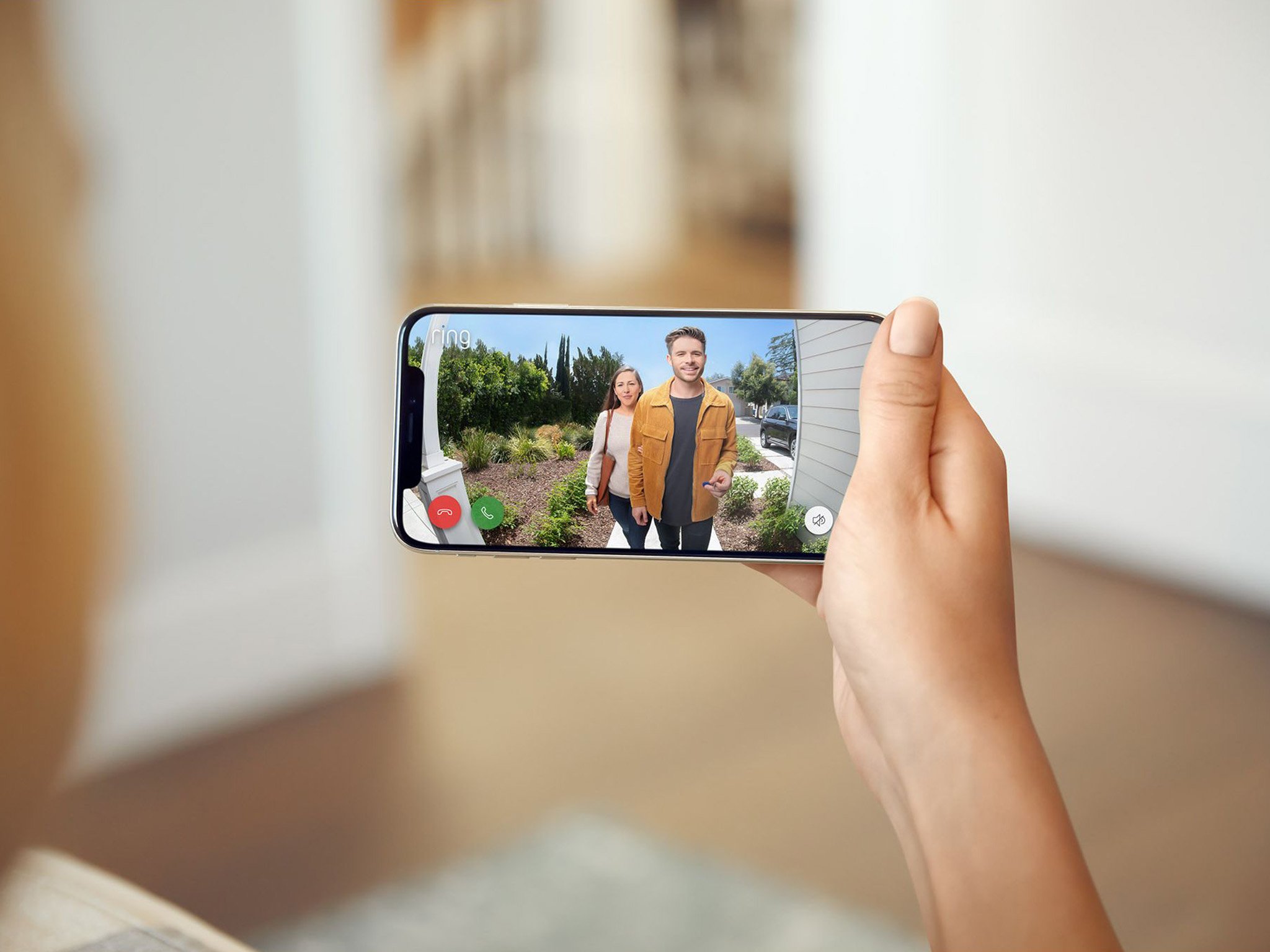Privacy at its core
Ring Video Doorbell 3
Pros
- Adjustable motion zones
- Dual-band 2.4Ghz/5Ghz Wi-Fi
- Privacy zones
- No wiring needed since it's battery-powered
Cons
- Poor Google Assistant integration
The Ring Video Doorbell 3 isn't a mind-blowing generational leap, but it's a significant product upgrade nonetheless. With a focus on privacy, better motion detection, and improved compatibility with faster, modern Wi-Fi networks, the Ring Video Doorbell 3 is an excellent choice for anyone looking for a powerful battery-operated video doorbell.
The late, great contender
Ring Video Doorbell 2
Pros
- No wiring needed since it's battery-powered
Cons
- Only supports 2.4GHz networks
- Poor Google Assistant integration
- Can't customize motion detection
- Probably not available new anymore
Ring has made a name for itself over the years, and the Ring Video Doorbell 2 has been at the forefront of that. The Ring Video Doorbell 2 isn't being sold at many places nowadays, so if you need a new video doorbell, it's probably time to look elsewhere.
Ring has been at the forefront of the wireless doorbell industry for many years now, and the third-generation Ring Video Doorbell is proof of that. Ring took its experience in the industry and improved upon the core functionality of its product, introducing the best motion detection it has ever put in a video doorbell. On top of this, Ring has improved privacy features, added 5GHz Wi-Fi network support, and improved the battery life and overall performance with the Ring Video Doorbell 3. Ring doesn't make the Ring Video Doorbell 2 anymore, and for a good reason: it's simply obsolete.
Ring Video Doorbell 3 It's all in the motions
From the outside, you'd be hard-pressed to tell the difference between the second and third-generation Ring Video Doorbells. But the hardware that resides under that familiar plastic housing is a very different story, and it directly affects how motion is detected. A brand new adjustable motion zone, called the Near Zone, can detect motion within 5-15 feet of the Ring Video Doorbell 3's camera. That helps cut down on the number of false notifications caused by cars driving by (usually more than 15ft away), and bugs flying or crawling in front of the camera (which are much closer than 5ft from the camera).
Within the app, you can also adjust any specific section of the video that you want the Ring Video Doorbell 3 to monitor for motion. This helps significantly cut down on the number of erroneous motion detection notifications that pop up. For example, you'll finally be able to block out sections of the video where a flag regularly waves, cars drive by, or trees tend to blow. That means the doorbell can now detect motion only where it's actually wanted — on your porch.
Cutting down on notifications is essential in a world where we're constantly bombarded by too much information all day long. No one wants their video doorbell to spam them with useless notifications, as this could eventually create an environment where you end up ignoring the notifications that are designed to help secure your property.
These features have been offered on the older wired Ring Doorbell Pro, but that requires quite a bit of extra installation and wiring that renters aren't normally allowed to do. The Ring Video Doorbell 3 brings these features to the battery-powered world with a rechargeable battery and doesn't skimp on features.
| Ring Video Doorbell 3 | Ring Video Doorbell 2 | |
|---|---|---|
| Price (MSRP) | $200 | $200 |
| Video Quality | 1080p | 1080p |
| Field of view | 160 degrees | 160 degrees |
| Dimensions | 5.1 in. x 2.4 in. x 1.1 in. | 5.05 in. x 2.50 in. x 1.08 in. |
| Motion Detection | Advanced motion detection with adjustable motion zones | Basic detection |
| Privacy Zones | Yes | No |
| Connectivity | 2.4GHz and 5GHz | 2.4GHz |
| Smart Assistant Integration | Amazon Alexa | Amazon Alexa |
| Power Source | Quick-release rechargeable battery pack | Quick-release rechargeable battery pack |
Ring Video Doorbell 3 Privacy and connectivity
While the ability to exclude certain sections of the video from recording motion detection is excellent, being able to block them out from recording completely is even better. That new ability is a massive step in the right direction for privacy advocates and concerned consumers alike, and it's rightly called Privacy Zones.
There are any number of reasons you might want to exclude portions of the Ring Video Doorbell 3's video from recording, and, thankfully, the way to do it is easy. From within the app, you can simply draw a shape around the area you'd like to exclude, and from then on, recordings from the camera will black this section out and ignore its existence altogether.
In addition to being better in touch with privacy concerns, the Ring Video Doorbell 3 can be better in touch with your network thanks to the addition of 5GHz Wi-Fi support. Home routers began offering 5GHz signals years ago to increase bandwidth and speed, as well as to help reduce wireless traffic interference. While 5GHz won't physically go as far in the home, the best mesh routers like Google WiFi or Ubiquiti AmpliFi will help extend this faster network while increasing coverage.
The Ring Video Doorbell 2 only supports the slower 2.4GHz Wi-Fi bands, which are also more prone to interference from common appliances like microwaves and cordless home phones. Ring Video Doorbell 3's ability to utilize both the 2.4GHz and 5GHz bands means that it can select the faster 5GHz band to deliver higher quality audio and video, but can always fall back on the 2.4GHz band if that 5GHz one isn't strong enough outside your front door.
Ring Video Doorbell 3 vs. Ring Video Doorbell 2 Small changes can make a big difference
The leap between generations of Ring Video Doorbells isn't massive, but a few key differences make the Ring Video Doorbell 3 an easy choice. It's only $30 more than the Ring Video Doorbell 2 and yet offers better connectivity, more privacy options, and the ability to hone motion detection to help reduce erroneous notifications. Those are all essential upgrades and create a more trustworthy product that's more likely to inform you of something important while still protecting your personal privacy.
At $200, it probably doesn't make sense to upgrade from the Ring Video Doorbell 2, but it certainly makes sense to buy it over the Ring Video Doorbell 2 if you're looking for a new video doorbell to buy.
See all the right things
Ring Video Doorbell 3
A substantive choice
$200 at Amazon $200 at Best Buy $200 at Home Depot
Ring Video Doorbell 3 brings a few key improvements to the table, like better motion detection and privacy features, as well as the ability to handle faster, modern 5GHz Wi-Fi networks.
Saying goodbye to a legend
Ring Video Doorbell 2
Great if you've already got one
See it at Amazon See it at Best Buy See it at Home Depot
The Ring Video Doorbell 2 was notable for its time, but it's getting to be harder to find.




0 Response to "You Can See More: Is it worth upgrading to the Ring Video Doorbell 3 from the Doorbell 2?"
Post a Comment